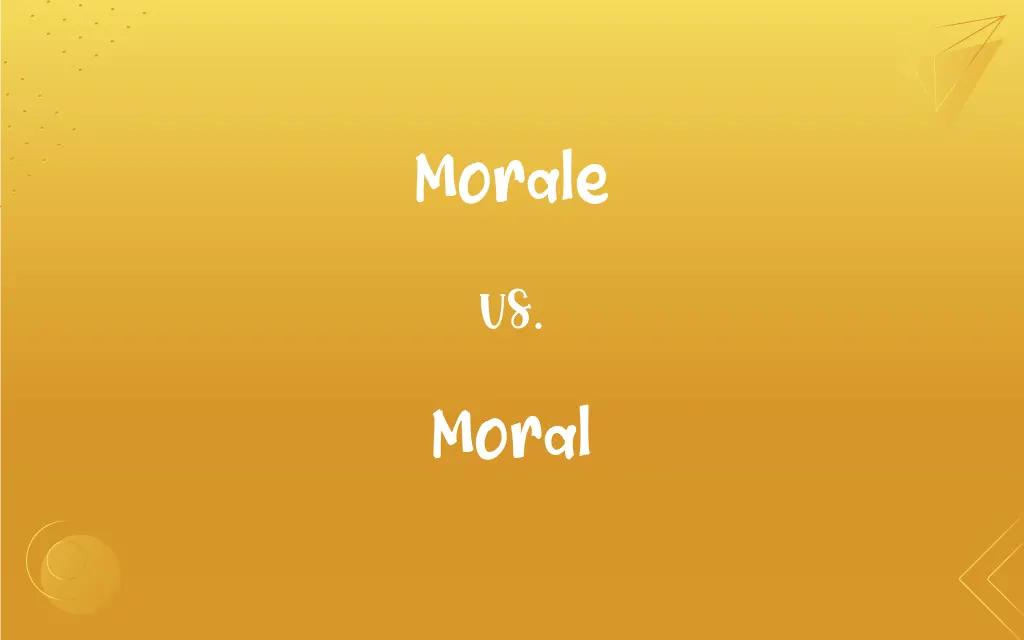Morale vs. Moral: What's the Difference?
Edited by Harlon Moss || By Janet White || Updated on October 21, 2023
Morale refers to the emotional or mental state of an individual or group, often related to confidence, enthusiasm, and discipline. Moral pertains to principles of right and wrong behavior or the goodness or badness of human character.

Key Differences
Morale is often used to discuss the emotional or mental condition of a group or individual, especially in the context of facing challenges, such as in a work environment or during a competition. It is a measure of confidence, enthusiasm, and the willingness to perform tasks. On the other hand, moral is an adjective that refers to the principles or teachings of what is right and wrong. Moral can be tied to ethical standards, rules of conduct, or the innate sense of fairness within individuals.
From a grammatical standpoint, both words serve different functions. Morale is primarily a noun, referring to a collective mental condition or spirit. Moral, however, can function as both a noun and an adjective, providing a descriptive quality to actions or situations regarding their ethical implications. While morale is about group dynamics or individual psychology, moral focuses on ethical considerations or principles.
The root words for morale and moral are different, further emphasizing their distinct meanings. Morale comes from the French word "moral," which pertains to mood or state of mind. Moral derives from the Latin word "moralis," which relates to manners or character. Thus, while the two terms might sound similar and are sometimes confused, their etymology and usage are quite different.
Morale has broad applications, from boosting a team's spirits to measuring the psychological well-being of a nation's citizens. On the other hand, moral has a more specialized role in philosophy, ethics, and individual decision-making. A moral decision implies an ethical choice based on a set of principles, while morale is about the state of mind or emotional condition of a person or group
Comparison Chart
Part of Speech
Noun
Noun and Adjective
ADVERTISEMENT
Definition
Emotional or mental state
Principles of right and wrong
Context
Group or Individual
Individual or Societal
Etymology
From French "moral"
From Latin "moralis"
Application
Psychology, Team Dynamics
Philosophy, Ethics
Morale and Moral Definitions
Morale
Measure of enthusiasm and confidence.
High morale led to increased productivity at work.
ADVERTISEMENT
Moral
Pertaining to principles of right and wrong.
The moral implications of the decision were clear.
Morale
State of collective optimism or pessimism.
The morale of the troops was low after the defeat.
Moral
Ethical quality of an action or behavior.
He questioned the moral integrity of the politician.
Morale
Emotional or mental condition of a person or group.
The coach's pep talk lifted the team's morale.
Moral
Relating to the character or disposition of a person.
Moral fortitude helped her overcome obstacles.
Morale
Level of willingness to perform tasks.
Employee morale is vital for job satisfaction.
Moral
Of or concerned with the judgment of right or wrong of human action and character
Moral scrutiny.
A moral quandary.
Morale
Emotional or mental status related to discipline.
Strict training routines enhanced the soldiers' morale.
Moral
Teaching or exhibiting goodness or correctness of character and behavior
A moral lesson.
Morale
The state of the spirits of a person or group as exhibited by confidence, cheerfulness, discipline, and willingness to perform assigned tasks
The staff's morale increased when everyone was given a day off with pay.
Moral
Conforming to standards of what is right or just in behavior; virtuous
A moral life.
Morale
The capacity of people to maintain belief in an institution or a goal, or even in oneself and others.
After the layoffs, morale was at an all time low; the staff were so dispirited nothing was getting done.
Morale is an important quality in soldiers. With good morale they'll charge into a hail of bullets; without it they won't even cross a street.
A morale-boosting exercise
Moral
Arising from conscience or the sense of right and wrong
A moral obligation.
Morale
The moral condition, or the condition in other respects, so far as it is affected by, or dependent upon, moral considerations, such as zeal, spirit, hope, and confidence; mental state, as of a body of men, an army, and the like.
Moral
Having psychological rather than physical or tangible effects
A moral victory.
Moral support.
Morale
A state of individual psychological well-being based upon a sense of confidence and usefulness and purpose
Moral
Based on strong likelihood or firm conviction, rather than on the actual evidence
A moral certainty.
Morale
The spirit of a group that makes the members want the group to succeed
Moral
The lesson or principle contained in or taught by a fable, a story, or an event.
Moral
A concisely expressed precept or general truth; a maxim
Likes to follow the moral "To each, his own.".
Moral
Morals Rules or habits of conduct, especially of sexual conduct, with reference to standards of right and wrong
A person of loose morals.
A decline in the public morals.
Moral
Of or relating to principles of right and wrong in behaviour, especially for teaching right behaviour.
Moral judgments;
A moral poem
A moral obligation
Moral
Conforming to a standard of right behaviour; sanctioned by or operative on one's conscience or ethical judgment.
A moral action
Moral
Capable of right and wrong action.
A moral agent
Moral
Probable but not proved.
A moral certainty
Moral
Positively affecting the mind, confidence, or will.
A moral victory;
Moral support
Moral
(of a narrative) The ethical significance or practical lesson.
Moral
Moral practices or teachings: modes of conduct.
A candidate with strong morals
Moral
(obsolete) A morality play.
Moral
A moral certainty.
Moral
An exact counterpart.
Moral
(intransitive) To moralize.
Moral
Relating to duty or obligation; pertaining to those intentions and actions of which right and wrong, virtue and vice, are predicated, or to the rules by which such intentions and actions ought to be directed; relating to the practice, manners, or conduct of men as social beings in relation to each other, as respects right and wrong, so far as they are properly subject to rules.
Keep at the least within the compass of moral actions, which have in them vice or virtue.
Mankind is broken loose from moral bands.
She had wandered without rule or guidance in a moral wilderness.
Moral
Conformed to accepted rules of right; acting in conformity with such rules; virtuous; just; as, a moral man. Used sometimes in distinction from religious; as, a moral rather than a religious life.
The wiser and more moral part of mankind.
Moral
Capable of right and wrong action or of being governed by a sense of right; subject to the law of duty.
A moral agent is a being capable of those actions that have a moral quality, and which can properly be denominated good or evil in a moral sense.
Moral
Acting upon or through one's moral nature or sense of right, or suited to act in such a manner; as, a moral arguments; moral considerations. Sometimes opposed to material and physical; as, moral pressure or support.
Moral
Supported by reason or probability; practically sufficient; - opposed to legal or demonstrable; as, a moral evidence; a moral certainty.
Moral
Serving to teach or convey a moral; as, a moral lesson; moral tales.
Moral
The doctrine or practice of the duties of life; manner of living as regards right and wrong; conduct; behavior; - usually in the plural.
Corrupt in their morals as vice could make them.
Moral
The inner meaning or significance of a fable, a narrative, an occurrence, an experience, etc.; the practical lesson which anything is designed or fitted to teach; the doctrine meant to be inculcated by a fiction; a maxim.
Thus may we gather honey from the weed,And make a moral of the devil himself.
To point a moral, or adorn a tale.
We protest against the principle that the world of pure comedy is one into which no moral enters.
Moral
A morality play. See Morality, 5.
Moral
To moralize.
Moral
The significance of a story or event;
The moral of the story is to love thy neighbor
Moral
Relating to principles of right and wrong; i.e. to morals or ethics;
Moral philosophy
Moral
Concerned with principles of right and wrong or conforming to standards of behavior and character based on those principles;
Moral sense
A moral scrutiny
A moral lesson
A moral quandary
Moral convictions
A moral life
Moral
Adhering to ethical and moral principles;
It seems ethical and right
Followed the only honorable course of action
Had the moral courage to stand alone
Moral
Arising from the sense of right and wrong;
A moral obligation
Moral
Psychological rather than physical or tangible in effect;
A moral victory
Moral support
Moral
Based on strong likelihood or firm conviction rather than actual evidence;
A moral certainty
Moral
Conforming to accepted standards of conduct.
It's a moral responsibility to help those in need.
Moral
A lesson or principle taught through a story or event.
The moral of the story is to be kind to others.
FAQs
What does Moral mean?
Moral pertains to the principles of right and wrong behavior.
What does Morale refer to?
Morale refers to the emotional or mental condition of an individual or group.
How are Morale and Moral different in usage?
Morale is used to describe emotional states, while Moral is used to discuss ethical considerations.
Can Moral be both a noun and an adjective?
Yes, moral can function as both a noun and an adjective.
What constitutes a Moral dilemma?
A moral dilemma is a situation requiring a choice between equally undesirable ethical options.
What is the Moral of a story?
The moral of a story is the lesson or ethical principle it aims to convey.
Is Morale always group-related?
No, morale can refer to both individual and group mental states.
What is low Morale?
Low morale refers to a lack of enthusiasm, confidence, or willingness to perform tasks.
What are Moral values?
Moral values are the ethical principles that guide behavior and decision-making.
Does Morale affect performance?
Yes, high morale generally leads to better performance and productivity.
How is Morale boosted?
Morale can be boosted through motivation, positive reinforcement, and achieving shared goals.
Is Morale just emotional?
No, morale encompasses emotional, mental, and sometimes even physical states.
How are Moral principles formed?
Moral principles are often formed through cultural teachings, personal experiences, and ethical reasoning.
Can something be Morally wrong but legally right?
Yes, something can be morally wrong but still conform to the law.
How do you measure Morale?
Morale can be measured through surveys, observation, and performance metrics.
About Author
Written by
Janet WhiteJanet White has been an esteemed writer and blogger for Difference Wiki. Holding a Master's degree in Science and Medical Journalism from the prestigious Boston University, she has consistently demonstrated her expertise and passion for her field. When she's not immersed in her work, Janet relishes her time exercising, delving into a good book, and cherishing moments with friends and family.
Edited by
Harlon MossHarlon is a seasoned quality moderator and accomplished content writer for Difference Wiki. An alumnus of the prestigious University of California, he earned his degree in Computer Science. Leveraging his academic background, Harlon brings a meticulous and informed perspective to his work, ensuring content accuracy and excellence.








































































